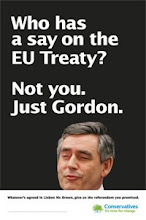I predicted this here and here and gave you a couple of nice quotations here:
1."Speculation begins when a price is going up and the presumptively wise expect a further increase. They buy and thus produced the increase. More buy, and more and yet more are attracted. Each price increase affirms the good sense of those who have bought before. Those who doubt are reviled as creatures of defective imagination. The buying and the supporting mood continue until the available supply of mentally vulnerable, economically viable buyers is exhausted. Then come the changed views of the prospect, the rush to get out, the pressure now of creditors demanding repayment of the loans that financed purchase, thus forcing sale. In short, the crash."
So wrote John Kenneth Galbraith in his book "In a Journey Through Economic Time" in which he described the warning signs that led up to the crash of 1929.
2. A shorter more pithy quotation from 1929 that is, so far as I know, unattributed was "When the lift boy says buy, it’s time to sell".
Today, I see that the word is spreading. The Telegraph report that "As central banks continue to splash their cash over the system, so far to little effect, Ambrose Evans-Pritchard argues that things risk spiralling out of their control
Twenty billion dollars here, $20bn there, and a lush half-trillion from the European Central Bank at give-away rates for Christmas. Buckets of liquidity are being splashed over the North Atlantic banking system, so far with meagre or fleeting effects.
As the credit paralysis stretches through its fifth month, a chorus of economists has begun to warn that the world's central banks are fighting the wrong war, and perhaps risk a policy error of epochal proportions.
York professor Peter Spencer, chief economist for the ITEM Club, says the global authorities have just weeks to get this right, or trigger disaster.
"The central banks are rapidly losing control. By not cutting interest rates nearly far enough or fast enough, they are allowing the money markets to dictate policy. We are long past worrying about moral hazard," he says.
"They still have another couple of months before this starts imploding. Things are very unstable and can move incredibly fast. I don't think the central banks are going to make a major policy error, but if they do, this could make 1929 look like a walk in the park," he adds."
Do read the rest but I warn you it is a depressing read.
Big Politics Night! 18-04-2024
8 hours ago










No comments:
Post a Comment